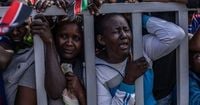In the rural town of Bondo, Kenya, a nation paused on October 19, 2025, as thousands gathered to pay their final respects to Raila Odinga, the revered former prime minister and democracy champion whose influence reached far beyond Kenya’s borders. The funeral, marked by heavy security and full military honors, unfolded amid a backdrop of both mourning and unrest, underscoring the profound impact Odinga had on his country and the African continent at large.
Odinga, who died at age 80 in India on October 15 after collapsing during a morning walk, was laid to rest beside his father, Jaramogi Oginga Odinga, Kenya’s first vice president and a key figure in the nation’s struggle for independence. According to The Associated Press, Odinga’s passing triggered an outpouring of grief, with his body received by thousands of mourners in Nairobi just a day after his death. The somber procession from the airport to the city’s soccer stadium saw devoted supporters trekking nearly 18 miles, a testament to the loyalty and admiration he commanded throughout his decades in public life.
But the national farewell was marred by tragedy. In the three days leading up to the funeral, four public viewing events drew massive crowds, and the sheer volume of mourners led to deadly chaos. As reported by The Express and AP, five people lost their lives and hundreds sustained injuries in stampedes and clashes with security forces. During the initial public viewing at Nairobi’s 60,000-seat stadium, tensions flared as crowds surged toward the pavilion where Odinga’s casket lay. Police responded with live ammunition and tear gas, resulting in at least three fatalities. Kenya’s chief of police operations, Adamson Bungei, confirmed, “We have at least two deaths for now,” describing the incident as a confrontation whose exact cause remained unclear.
These tragic scenes prompted a significant ramp-up in security for the funeral itself. Military personnel, regular police, and aerial surveillance teams were deployed in Kisumu and Bondo to ensure order during the final ceremonies. Despite the heavy presence, the sense of loss and unity among the attendees was palpable, as dignitaries from across Africa joined Kenyans in celebrating the life and legacy of a man often described as a “selfless pan-Africanist.”
Odinga’s political journey was as storied as it was turbulent. While he never succeeded in his five bids for the presidency, his influence on Kenyan politics was undeniable. He played a pivotal role in mediating political agreements with three different presidents during times of national crisis. Most recently, in March 2025, Odinga entered into a political pact with President William Ruto, a move that helped defuse months of anti-government protests and violence, including the storming and partial burning of parliament buildings by young demonstrators. As President Ruto acknowledged on October 17, “Odinga helped me steady the country.”
Odinga’s reach extended well beyond Kenya’s borders. He was a prominent figure in pan-African politics, having unsuccessfully run for the African Union chairperson position and previously mediating political impasses across the continent. Former AU Deputy Chairperson Erastus Mwencha captured this sentiment, stating, “I see him as one of those who fought for the second liberation,” and noting that many African nations are still grappling with the challenges of democracy.
His domestic legacy is equally significant. As prime minister in 2010, Odinga was instrumental in the constitutional review that reshaped Kenya’s political landscape. According to Devdiscourse, dozens of world leaders have since praised his statesmanship, highlighting his role as a stabilizing force during turbulent times. Among those who paid tribute was former U.S. President Barack Obama, who lauded Odinga for his steadfast commitment to democratic principles.
The days leading up to the funeral were marked by a series of public viewings and tributes across Kenya, all carefully documented in live blogs and news reports. Massive crowds gathered in cities like Kisumu and Nairobi, with many camping overnight to ensure a final farewell. The emotional intensity of these gatherings underscored the deep connection many Kenyans felt to Odinga, whose political career spanned decades and whose advocacy for reform and justice resonated with millions.
Yet, the violence that erupted during the funeral events also served as a stark reminder of the volatility that has often accompanied Kenya’s political transitions. The causes of the deadly confrontations remain under investigation, but the sheer scale of the crowds and the charged atmosphere made for a combustible mix. Authorities have faced criticism for their handling of crowd control, but many observers also pointed to the extraordinary circumstances: the passing of a figure who, for many, embodied the hopes and frustrations of a nation still wrestling with its democratic aspirations.
Odinga’s family—his wife Ida and children Rosemary, Raila Junior, and Winnie—stood by as he was laid to rest with both military and traditional rites. The burial next to his father was deeply symbolic, linking two generations of leadership and struggle in Kenya’s ongoing quest for self-determination and progress.
For those who attended the funeral, and for millions more who watched from afar, the day was a moment of both reflection and reckoning. Odinga’s career was marked by resilience in the face of repeated electoral defeat, a willingness to broker peace when others might have chosen confrontation, and a lifelong commitment to the ideals of democracy and pan-African unity. As crowds dispersed from Bondo, the sense lingered that Kenya—and indeed Africa—had lost not just a political leader, but a symbol of perseverance, dialogue, and hope.
Odinga’s death leaves a void in Kenyan politics, but his legacy endures in the constitutional reforms he championed, the alliances he forged, and the countless lives he touched. The challenges that marked his final journey home, from the violence at public viewings to the extraordinary security measures at his burial, are a testament to both the passion he inspired and the complexities of the democracy he sought to build. As Kenya moves forward, the lessons of his life and the tributes paid in his honor will undoubtedly shape the country’s path for years to come.



